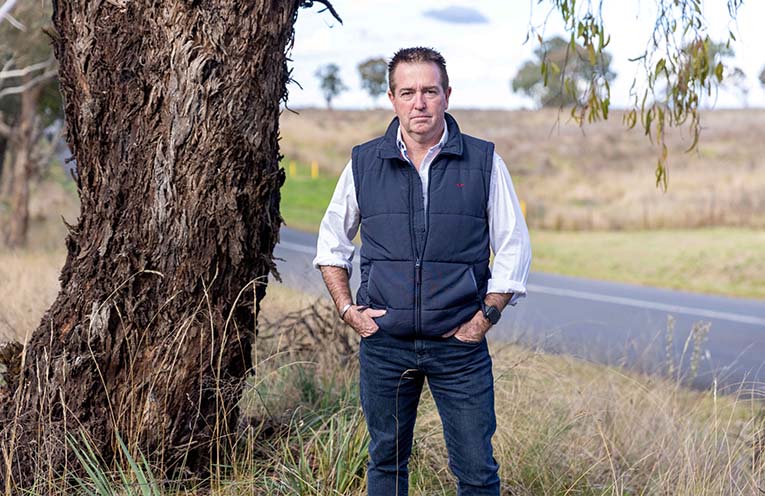
AS logging protests continue in earnest across the Mid North Coast, Member for Bathurst Paul Toole moved a notice of motion in NSW Parliament last week to protect the livelihoods of timber workers and the industry’s contribution to the economy.
Concerns are held for the future of native forestry in NSW as Labor considers following the lead of Western Australia and Victoria in phasing out the industry.
 Advertise with News of The Area today.
Advertise with News of The Area today.It’s worth it for your business.
Message us.
Phone us – (02) 4981 8882.
Email us – media@newsofthearea.com.au
The NSW Forestry industry employs over 9,000 people and contributes an estimated $2.1 billion to the state’s economy.
“These people are directly employed by the native forestry industry, but this does not account for all the related contractors in the supply chain that are located across this state and are also at risk of losing their jobs,” Mr Toole said.
“I moved a Notice of Motion calling on the NSW Government to acknowledge and continue to support the native forestry as it is a major industry and economic driver of the NSW economy and that any winding back or closing it down in any way like Victoria or Western Australia would devastate communities.
“Ending such a major contributor to the NSW economy would leave timber workers out of work, seeing sawmill operators and their communities lose jobs and it would also negatively affect the state’s economy by wiping out one of our successful industries.
“We also don’t want to create a burden on the NSW Government departments who would become responsible for managing the land that would be no longer allocated for forestry operations.”
Mr Toole also said he is concerned that a reduction in domestic supply will mean Australians will become even more reliant on imported timber.
The Australian Forest Products Association (AFPA) forecasts that Australia’s reliance on imported timber will double by 2050 and that there will be an implied gap between demand and local production of 2.6 million cubic meters per annum.
“Why would we want to start importing yet another product that could have been jobs in our backyard and dollars in our pockets?” he said.
At last week’s annual Labor conference, where forestry was a hot topic, Timber NSW CEO Maree McCaskill implored NSW Labor to consider the impact of ending an entire industry.
“NSW native forestry is the most heavily regulated forest industry in the world and only harvest less than one percent each year of the available twelve percent of state forest.
“National parks and conservation reserves already protect 88 percent of public forest,” she said.
However, pressure is mounting on the NSW Government to ban native forestry, with the Federal Labor national conference endorsing a motion last Thursday to “move to 100 percent plantation timber and end broadscale land clearing”.
The motion included key reforms, including committing to “delivering the Glasgow Leaders Declaration on forests and land use which commits Australia to ‘halt and reverse forest loss and land degradation by 2030’” and to working “with states and territories to update the 1992 National Forest Policy Statement to ensure it is contemporary and fit for purpose, [including] the application of National Environmental Standards to Australia’s native forests”.
Nature Conservation Council CEO Jacqui Mumford welcomed the motion.
“The motion will now require the federal government to work with each State and Territory to stop the reckless destruction that has seen Eastern Australia named as one of the 24 global deforestation hotspots – making us the only developed nation on the list,” Mumford said.
“It’s great to see that the vast majority of NSW Labor branches recognise that this is the quickest, easiest and cheapest way to reduce Australia’s emissions and protect our environment.
“This will have a particular impact on NSW, where the 2016 biodiversity management and conservation laws saw a tripling in the rate of land clearing.
“Land clearing is the greatest threat to biodiversity in NSW, with 95,000 ha of land and 50 million trees being cleared every year in NSW alone.
“Land clearing is responsible for ten percent of Australia’s C02 Emissions (40 million tonnes per year), equivalent to the emissions produced by every household in Sydney.
“Native forest logging accounts for another nine million tonnes, equivalent to the emission from all cars in Australia for three and a half years.
“Australians do not support the runaway land clearing and native forest logging that has been allowed to flourish under coalition governments.
“Research conducted by the Biodiversity Council found 81 percent of Australians support tougher fines and stronger laws to stop illegal tree clearing and forest habitat destruction,” Mumford said.
A spokesperson from the office of Tara Moriarty, Minister for Agriculture and Regional NSW, reiterated the NSW Government’s commitment to “the NSW forestry industry and the important jobs it supports in communities across NSW”.
“When it comes to logging and the timber industry, we know we have to get the balance right.
“We need a truly sustainable timber industry in NSW, as well as protection for crucial habitat,” the spokesperson said.
